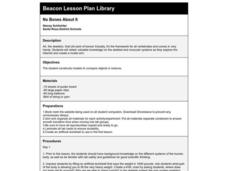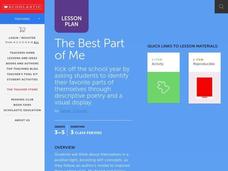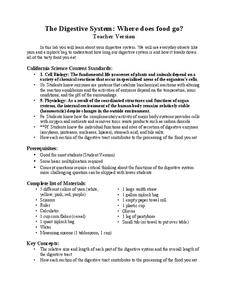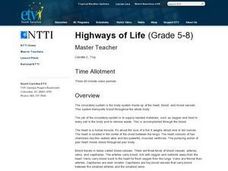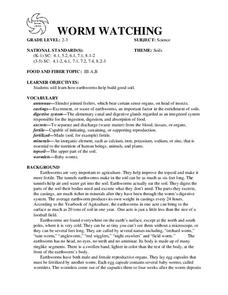Curated OER
Skin as an Organ
Students are introduced to human skin as an organ of the body with many roles, functions and interactions with other organs. They investigate the integumentary system in groups and complete a worksheet with their findings.
Curated OER
No Bones About It
Young scholars conduct Internet research on the different parts of the skeletal system. Then they create a model arm that demonstrates how muscle and bone work together to create movement.
Curated OER
Organ Systems
Students state the name of major body systems, They identify what each system does and list the major organs in each system. In addition, they complete a puzzle matching organ systems to organ function.
Curated OER
Best Part of Me
Students determine a positive physical feature of themselves. They participate in an online writer's workshop and write descriptive poem about their favorite feature. They create a display of poetry and pictures.
Curated OER
Anatomy
Fourth graders describe how health behaviors affect body systems, and describe the basic function of major body systems.
LABScI
Vision Lab: The Eye
Our bodies have some amazing capabilities, but there are some limitations. Explore the limitations of the human eye through the eighth lab activity in a series of 12 biology lessons. Individuals measure their own peripheral vision...
LABScI
The Digestive System: Where Does Food Go?
Would you believe that your digestive system stretches to five times your height?! Help your pupils to understand this relationship as they work through the laboratory exercise. The first instructional activity of a 12-part series is a...
Curated OER
Highways of Life
Young scholars explore the circulatory system. They participate in media activities to explore blood flow and identify the parts of the circulatory sytem. Students create a model of the circulatory system.
Curated OER
Lub Dub
Learners name the vessels and parts of the heart. They trace the path of blood through the heart. Students examine the function of the circulatory system. They recognize the differences between a hear when the body is at rest opposed to...
Curated OER
WORM WATCHING
Students investigate how earthworms help build good soil. They examine the worms carefully to find the ringlike segments and swollen band at the front of the earthworm's body. Students take turns dampening the soil every day and adding...
Curated OER
Coping with Changes
Students build on knowledge of brain and nervous system in order to write about how their nervous systems help them cope with change in environment. Students navigate online sites to explore different parts of brain and nervous system.
Curated OER
Can Acids and Bases Remedy the Body?
Young scholars try to cure an upset stomach. In this acids and bases in the body lesson, students create a upset stomach with a vinegar and water solution, then use antacids and home remedies to attempt to restore pH balance to the...
Pennsylvania Department of Education
The Digestive System
Fourth graders simulate how the digestive system works. In this hands-on simulation, 4th graders complete six group activities that help students visualize how our body breaks down food into nutrients.
Curated OER
Human Abstraction
Students explore and compare abstraction of human forms in various ancient cultures and by creating self-portraits using geometric shapes. They identify which geometric shapes form the following features: face, nose, arms, torso, legs,...
Curated OER
It May Be Yucky, But Someone Has To Teach It. . .
Fourth graders study the names and parts of the excretory system in this hands-on activity. They use common items to make a model of the system.
Curated OER
Digestive System
Students analyze how the digestive system works by taking the food we eat and breaking it down for our bodies to use for various reasons. They list the major components of the digestive system and draw a diagram. They explain how...
Curated OER
Feed Me, Seymour
Students work in small groups to create posters illustrating the major facts and functions of plant organs. Within their groups, they assume the role of specialists creating specialized posters pertaining to the different parts of plants.
Curated OER
How Does the Cardiovascular System Work?
Students explore the basic anatomy and functions of the cardiovascular system. They identify parts of the cardiovascular system according to the levels of organization. In addition, they trace the path of a blood cell through the...
Curated OER
Circulation
Students define the functions of the circulatory system. In this body circulation instructional activity students see how engineers have involvement with the circulatory system.
Curated OER
Biomedical Devices for the Eyes
Students study the structures of the human eye. In this eye device lesson plan students examine different eye problems and devices that can help to resolve them.
Curated OER
H2O in Us
Students discover through this activity that all organisms are composed of water. They find that 70 percent of their bodies are made up of water that is in thier cells and blood, and not free-flowing throughout their body.
Curated OER
Pump It Up!
Students design a pumping device that will effectively pump fluid through a model "cardiovascular system." They explore the effects of too much and too little pressure on a circulatory system.
Baylor College
What Is a Neuron?
Your class won't get on your nerves while doing this modeling activity! After teaching the structure and function of a neuron using the included diagrams, give individuals some clay and chenille stems so that they can make their own...
Baylor College
Heart and Lungs
With a partner, youngsters measure their pulse and breathing rates, both at rest and after running in place for a minute. While this activity is not novel, the lesson plan includes a large-scale classroom graphing activity and other...

